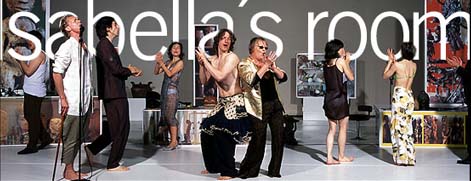|
Ossified, petrified, mummified objects, fetishes, collectibles of one kind or another, fill up the white space, set up on half of the Mershon Stage at the Wexner Center for the Arts, Ohio State University, Columbus, Ohio. The audience sits on the left side of the stage facing the right. The Needcompany, a Brussels based theatre troupe, does the story up by using a variety of viewpoints surrounding the objects.
Jan Lauwers, the director/designer of the Needcompany, dressed impeccably in white, and fitting right into the décor, steps out to talk to the audience. "What motivated the story?", he says. "Several thousand ethnological and archaeological objects left behind by my father". To quote the program: "Isabella is old and blind when she looks back over her life. She lives in her room in Paris, surrounded by the thousands of exotic objects plundered from Ancient Egypt and black Africa by her father."
 |
Plundered is a key verb in this equinox of lost horizons, where objects are referenced, put aside, and remain lingering in the mind's eye. Isabella's Room is also a family history; both episodic and kaleidoscopic, a dealer's choice, a mind blow out experiment supposedly done by a research hospital. I think of it as multi-dimensional theatrical exercise, with only the bare bones of a plot to move the action along.
When her father left her cold, Isabella's foster parents, Arthur (Benoit Gob) and Anna (Anneke Bonnema) raised her in a lighthouse. The surrounding sea was a place to drown losses. Isabella was raised with a lie. She was told that her father was a "desert prince" who "disappeared on an expedition". The archly romantic phrase "desert prince" calls up fleeting images of Rudolph Valentino, Ramon Navarro, or even Lawrence of Arabia. Well, is it the lie that caused Isabella's blindness – or the research experiment? And could it be that keeping her father alive in her mind's eye became the source of her nymphomania? All we know is that Isabella's life is a cul de sac; the life of a good natured woebegone.
Vivane De Muynck captures the dead weight of Isabella's isolated being with quick wit and informality. Her Isabella tosses away asides like cigarette butts. The action in her mind's eye hovers on her eye lids. With the simple act of taking her dark glasses on and off, De Muynck reveals a series of fractured perspectives that haunt and enlighten Isabella. An electrified ritual of view points, action, talk and dance, from a variety of characters in Isabella's life, reflect on her destiny as an outsider. The play, and by play, essentially asks the audience to make sense out of it. When Isabella whimsically lifts off a necklace dangling from an extended sculptural penis, the humor takes on a life of its own. For it takes a stretch of the imagination to ponder Isabella's love life. And who knows what an extended object might do if given half a chance?
Isabella takes on lovers right and left, right up to, and through, her old age. Shrugging her shoulders over one loss after another, she starts off the auction of her objects by asking for a cigarette from Frank, her latest young lover. Then she kisses him with all the passion of an 84 year old. De Muynck knows how to use the thin line between illusion and reality to reveal essential Isabella character traits. You never know when the actress is on, or off. When she is acting, and when she is not. When Isabella survives with vision, and when she does not. De Muynck's moment to moment choices add to the effect.
The auction is the signature event of the production. Objects lifted from their cultural context appear deader than ever – like ugly, museum pieces –comments on cultural appropriation. Performers use narrative, dialogue, song, dance, acrobatics, displays of stolen icons, a variety of character revelations, and finally, at the climax, they pawn off the booty with irony. Hawking the stuff like ad hoc shoppers at Wal-Mart, grabbing at everything in sight that looks like a deal.
Isabella's Room uses the tricks of the experimental theatre trade to wade through events. Although story telling takes place, it takes place with a fractured spine, and never quite gels. The cast finishes off the event with a song "We Just Go On and On". A catchy repetitive tune, repeated until death do us part. I was initially intrigued by the event, and admired the vigor of the performances, but petrified objects can only take you so far - and pouf! The magic dragon disappears...
.
|